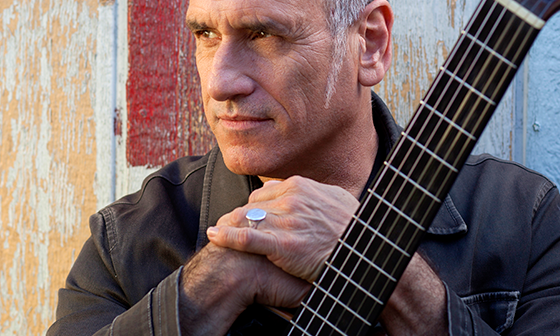
Singer/songwriter David Broza is a superstar in his home country of Israel, but a newcomer to the Rubin’s Naked Soul stage. In advance of his concert at the Rubin on April 8, we sat down with Broza to ask him a few questions about his music, performance, and his upcoming show at the Rubin.
How does performing in New York compare to performing in other places around the world?
The level of art performed in NYC is so varied and fine. The actual performance in the city is so very unique. As soon as one lands here, there is an energy that is unlike any other.
I can continue describing the effect of the energy, but it’s also the endless list of performances and art exhibits that are offered at any given day that fill me with the great stimulation and challenge: to be better than ever and more focused than ever.
The public also has a different attitude—When they buy a ticket to a show they have high expectations and the performer can feel it.
You’ve been recognized for using music to unite people from different walks of life. What do you hope people take away from hearing your music or seeing you perform ?
I am not sure that I would describe myself as someone who unites people through music. However, I have used music throughout my career to take part in social activities, sometimes political, and more often as a tool for bridge building.
In recent years, and especially in my recent album “East Jerusalem West Jerusalem” (which is also a documentary with the same title) I have brought Israeli musicians along with Palestinian musicians in East Jerusalem—the Palestinian side of the city—under one roof to play music. I have used the magic of guitar playing and percussion too by extending my work to workshops with Palestinian kids in the refugee camp of Shuaffat, within the Jerusalem borders. It has been a very sobering experience.
Much of the art at the Rubin Museum is influenced by spirituality in one way or another. To what extent does spirituality influence your music?
I think art in general is a reflection of an artist’s spirituality. Whether I am aware of my spirituality or not aware of it—whether I practice disciplines of religious or ideal spirituality—whatever I create comes from a very deep need to express my thoughts and feelings. There is a lot of zen involved in the creative process as well as the performing process.
I think that bringing my music to the museum, and performing it in a very intimate theater, will allow me to reach and perform new and different spiritual interpretations to my songs. I am very curious to see where it takes me.
Join David Broza for his Naked Soul concert at the Rubin Museum on April 8.

